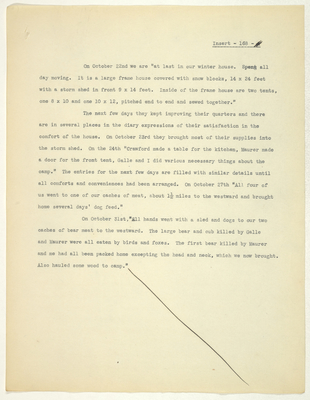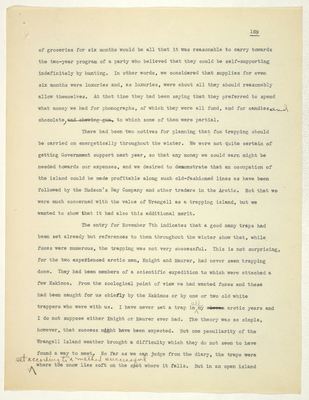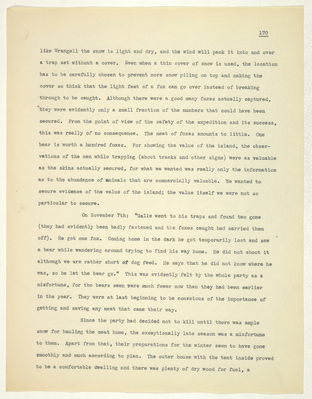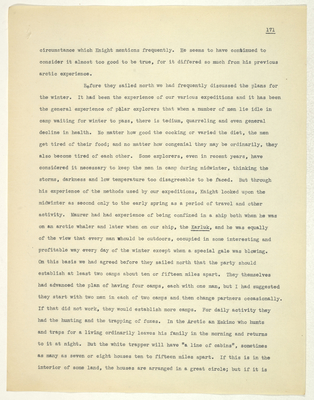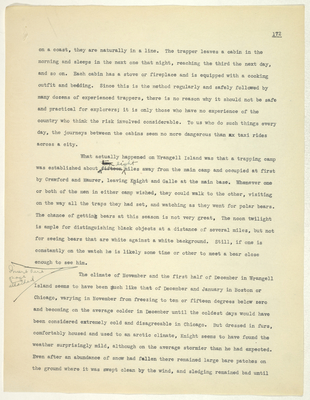Pages
stefansson-wrangel-09-29-016
Insert - 168 -
On October 22nd we are "at last in our winter house. Spent all day moving. It is a large frame house covered with snow blocks, 14 x 24 feet with a storm shed in front 9 x 14 feet. Inside of the frame house are two tents, one 8 x 10 and one 10 x 12, pitched end to end and sewed together."
The next few days they kept improving their quarters and there are in several places in the diary expressions of their satisfaction in the comfort of the house. On October 23rd they brought most of their supplies into the storm shed. On the 24th "Crawford made a table for the kitchen, Maurer made a door for the front tent, Galle and I did various necessary things about the camp." The entries for the next few days are filled with similar details until all comforts and conveniences had been arranged. On October 27th "All four of us went to one of our caches of meat, about 11/2 miles to the westward and brought home several days’ dog feed."
On October 31st," all hands went with a sled and dogs to our two caches of bear meat to the westward. The large bear and cub killed by Galle and Maurer were all eaten by birds and foxes. The first bear killed by Maurer and me had all been packed home excepting the head and neck, which we now brought. Also hauled some wood to camp."
stefansson-wrangel-09-29-017
169
of groceries for six months would be all that it was reasonable to carry towards the two-year program of a party who believed that they could be self-supporting indefinitely by hunting. In other words, we considered that supplies for even six months were luxuries and, as luxuries, were about all they should reasonably allow themselves. At that time they had been saying that they preferred to spend what money we had for phonographs, of which they were all fond, and for candies and chocolate, and chewing gum, to which some of them were partial.
There had been two motives for planning that fox trapping should be carried on energetically throughout the winter. We were not quite certain of getting Government support next year, so that any money we could earn might be needed towards our expenses, and we desired to demonstrate that an occupation of the island could be made profitable along such old-fashioned lines as have been followed by the Hudson's Bay Company and other traders in the Arctic. Not that we were much concerned with the value of Wrangell as a trapping island, but we wanted to show that it had also this additional merit.
The entry for November 7th indicates that a good many traps had been set already but references to them throughout the winter show that, while foxes were numerous, the trapping was not very successful. This is not surprising, for the two experienced arctic men, Knight and Maurer, had never seen trapping done. They had been members of a scientific expedition to which were attached a few Eskimos. From the zoological point of view we had wanted foxes and these had been caught for us chiefly by the Eskimos or by one or two old white trappers who were with us. I have never set a trap in all my eleven arctic years and I do not suppose either Knight or Maurer ever had. The theory was so simple, however, that success might have been expected. But one peculiarity of the Wrangell Island weather brought a difficulty which they do not seem to have found a way to meet. So far as we can judge from the diary, the traps were set according to a method successful where the snow lies soft on the spot where it falls. But in an open island
stefansson-wrangel-09-29-018
170
like Wrangell the snow is light and dry, and the wind will pack it into and over a trap set without a cover. Even when a thin cover of snow is used, the location has to be carefully chosen to prevent more snow piling on top and making the cover so thick that the light feet of a fox can go over instead of breaking through to be caught. Although there were a good many foxes actually captured, they were evidently only a small fraction of the numbers that could have been secured. From the point of view of the safety of the expedition and its success, this was really of no consequence. The meat of foxes amounts to little. One bear is worth a hundred foxes. For showing the value of the island, the observations of the men while trapping (about tracks and other signs) were as valuable as the skins actually secured, for what we wanted was really only the information as to the abundance of animals that are commercially valuable, We wanted to secure evidence of the value of the island; the value itself we were not so particular to secure.
On November 7th: "Galle went to his traps and found two gone (they had evidently been badly fastened and the foxes caught had carried them off). He got one fox. Coming home in the dark he got temporarily lost and saw a bear while wandering around trying to find his way home. He did not shoot it although we are rather short of dog feed. He says that he did not know where he was, so he let the bear go." This was evidently felt by the whole party as a misfortune, for the bears seen were much fewer now than they had been earlier in the year. They were at last beginning to be conscious of the importance of getting and saving any meat that came their way.
Since the party had decided not to kill until there was ample snow for hauling the meat home, the exceptionally late season was a misfortune to them. Apart from that, their preparations for the winter seem to have gone smoothly and much according to plan. The outer house with the tent inside proved to be a comfortable dwelling and there was plenty of dry wood for fuel, a
stefansson-wrangel-09-29-019
171
circumstance which Knight mentions frequently. He seems to have continued to consider it almost too good to be true, for it differed so much from his previous arctic experience.
Before they sailed north we had frequently discussed the plans for the winter. It had been the experience of our various expeditions and it has been the general experience of polar explorers that when a number of men lie idle in camp waiting for winter to pass, there is tedium, quarreling and even general decline in health. No matter how good the cooking or varied the diet, the men get tired of their food; and no matter how congenial they may be ordinarily, they also become tired of each other. Some explorers, even in recent years, have considered it necessary to keep the men in camp during midwinter, thinking the storms, darkness and low temperature too disagreeable to be faced. But through his experience of the methods used by our expeditions, Knight looked upon the midwinter as second only to the early spring as a period of travel and other activity. Maurer had had experience of being confined in a ship both when he was on an arctic whaler and later when on our ship, the Karluk, and he was equally of the view that every man should be outdoors, occupied in some interesting and profitable way every day of the winter except when a special gale was blowing. On this basis we had agreed before they sailed north that the party should establish at least two camps about ten or fifteen miles apart. They themselves had advanced the plan of having four camps, each with one man, but I had suggested they start with two men in each of two camps and then change partners occasionally. If that did not work, they would establish more camps. For daily activity they had the hunting and the trapping of foxes. In the Arctic an Eskimo who hunts and traps for a living ordinarily leaves his family in the morning and returns to it at night. But the white trapper will have "a line of cabins”, sometimes as many as seven or eight houses ten to fifteen miles apart. If this is in the interior of some land, the houses are arranged in a great circle; but if it is
stefansson-wrangel-09-29-020
172
on a coast, they are naturally in a line. The trapper leaves a cabin in the morning and sleeps in the next one that night, reaching the third the next day, and so on. Each cabin has a stove or fireplace and is equipped with a cooking outfit and bedding. Since this is the method regularly and safely followed by many dozens of experienced trappers, there is no reason why it should not be safe and practical for explorers; it is only those who have no experience of the country who think the risk involved considerable. To us who do such things every day, the journeys between the cabins seem no more dangerous than an taxi rides across a city.
What actually happened on Wrangell Island was that a trapping camp was established about fifteen ten eight miles away from the main camp and occupied at first by Crawford and Maurer, leaving Knight and Galle at the main base. Whenever one or both of the men in either camp wished, they could walk to the other, visiting on the way all the traps they had set, and watching as they went for polar bears. The chance of getting bears at this season is not very great. The noon twilight is ample for distinguishing black objects at a distance of several miles, but not for seeing bears that are white against a white background. Still, if one is constantly on the watch he is likely some time or other to meet a bear close enough to see him.
Insert here page attached
The climate of November and the first half of December in Wrangell Island seems to have been much like that of December and January in Boston or Chicago, varying in November from freezing to ten or fifteen degrees below zero and becoming on the average colder in December until the coldest days would have been considered extremely cold and disagreeable in Chicago. But dressed in furs, comfortably housed and used to an arctic climate, Knight seems to have found the weather surprisingly mild, although on the average stormier than he had expected. Even after an abundance of snow had fallen there remained large bare patches on the ground where it was swept clean by the wind, and sledging remained bad until
